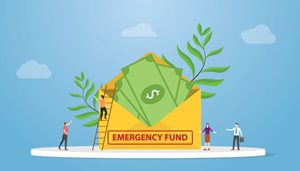The road to financial independence can be a struggle for many, but it’s not impossible if you gain the right knowledge and commit to making smart money decisions. The financial decisions you make when you are young may either pave the way for your future financial success or make it more difficult to achieve your dreams. Being young offers the advantage of having time and a clean slate. If you make financially smart choices from the start, you can set yourself on the path to success and avoid missteps that may cause long-term damage.
Here are some common mistakes young adults make and tips on how to avoid them.
Letting credit card debt pile up
The mistake:
Maxed-out credit cards are one of the worst debt burdens to carry, due to interest and fees. Credit is appealing because it allows you to buy items that you may not be able to afford otherwise. If you carry balances on credit cards, you’re paying the credit-card companies to borrow this money in monthly interest payments. 
Credit card debt -
- Is a cycle of high balances and minimum payments
- Can tank your credit score and take years to fix
The fix:
Important guidelines when it comes to using credit cards:
- Don’t rely on it to pay for life’s necessities
- Don’t overspend on things you don’t need
- Pay your balance in full or pay as much as you can. Only paying the minimum may cause you to be in debt for longer than you would like.
Example:
If you’re a new graduate who is just entering the workforce, try to put as much money as you can into your bank account during the first six months of your career. This will give you a head start on building your savings, making it easier to zero out your credit card balances every month.
Not building any credit
The mistake:
On the other end of the spectrum, many young adults wait too long to establish credit.
Not having a credit history can -
- Make it harder to borrow
- May have trouble qualifying for personal loans
- Harder time renting an apartment, even if you have a strong, steady income.
This is why it’s important to learn how to use credit responsively rather than avoid it entirely.
The fix:
You can get started by opening a Secured Rewards MasterCard.
- It works like a regular credit card.

- Your credit limit is determined by the amount of money you deposit and hold in a savings account (that even earns interest!)
- Begin using this card for a few things each month, such as gas or groceries.
- Make sure to pay every bill on time to establish a healthy credit score
- Get in the habit of paying off your credit card on time each month.
Spending at the rate of their earnings
The mistake:
When you’re young, living in the moment sounds a lot more appealing than planning for the future. These days, when anything you could ever desire is accessible with the touch of a screen or click of a button, spending money is very easy. But you’ll never reach financial freedom if you keep falling into the trap of “lifestyle inflation” or increasing your spending as your earnings go up. 
The fix:
- Create a budget and stick to it.
- Don’t upgrade to a bigger apartment just because you got a raise.
- Don’t plan for an expensive vacation just because you got a bonus.
- Focus on the bigger picture and save that money or use it to pay off any existing debt.
With just some minor belt-tightening, you can grow your money and spend it on more important goals. A core financial lesson is learning how to live within your means. Income should cover expenses, if it doesn’t, then stop overspending and overhaul your budget.
Ignoring student loans
The mistake:
When you’re facing debt in the tens of thousands of dollars while earning an entry-level salary, it’s tempting to just pretend it doesn’t exist.
Ignoring student loans can -
- Negatively impact your credit report due to late payments.
- A hit on a credit report leads to a lower credit score.
- Make it more difficult to receive the best interest rates in the future.
The fix:
Before leaving school, create a plan of action to repay student loans.
Determine - 
- Each loans total cost
- The monthly repayment amounts
- When loans are due
- How to submit payment.
- How long your loans qualify for a grace period
Once you start repayment, pay at least the minimum due, and make additional payments as your budget allows. There are several ways to work with the federal government or a private lender before missing a payment. Consider an alternative repayment plan, consolidation, refinancing, or deferment.
Not having an emergency fund
The mistake:
Young adults are often unaware of the need for an emergency fund and don’t consider saving for one. At any time, the unexpected could happen, scrambling for funds to pay for a large medical expense or to live on during an unexpected layoff can be a nightmare. In reality, the only way to secure a financial future is to save as early as possible. This is primarily due to the benefits of compound interest. Compound interest is interest earned on interest. It helps money grow, but only after several years. 
The fix:
Setting money aside in an emergency fund will not only reap the benefits of compound interest but create a safety net in case of unexpected expenses.
- Experts recommend socking away 3-6 months’ worth of living expenses. The key is to just get started, work with whatever you can to make monthly contributions.
- Set up an automatic monthly transfer so you never forget.
- Keep your emergency money in an account that offers an attractive earnings rate but allows you to withdraw funds without paying a penalty.
Example:
If you contribute $100 a month to your CUD Prime Share Savings Account with an initial $5 deposit. In one year with no withdrawals your total savings with be around $1,205 and off to a great start to building your emergency fund.
Not Financially Preparing for the Future
The mistake:
You need to ensure that you will have money for retirement. Since most young adults are just beginning their careers, they may not be thinking that far ahead. But don’t wait! You’ll be grateful down the road if you start early. The advantage to investing for retirement when you’re young is that your money has more time to grow and compound.
The fix: 
Don’t think of retirement savings as an extra; think of it as a necessary, fixed expense that belongs in your budget like your rent and phone bill.
- Work with the most you can afford and max out your contributions to an IRA or your company’s 401(k) plan.
- As your income increases, your retirement savings should increase with it.
Planning for your decades-away retirement may be one of the last things on your mind. However, starting to fund your retirement later in the game means missing out on years of compound interest gains.
Example:
- Financial professionals recommend contributing at least 15% of your income into a retirement fund. If your employer offers a matching contribution, take advantage of the full benefit, it’s free money!
- If you open a traditional IRA at 24 years old with an initial deposit of $3,000 and make an annual contribution of $6,000 with a 7% average annual return. In doing so if you retire at age 65, after taxes you could have around $1,000,000
Twenty-somethings are faced with financial pitfalls every day. Avoid these common mistakes to build a healthy financial future. Messed up while in your 20s? The motto "hindsight is 20/20" couldn't be truer for some, but the great news is, it's not too late to get your finances on track! Follow these tips for a financially sound future.
Sources and enhanced by Credit Union of Denver